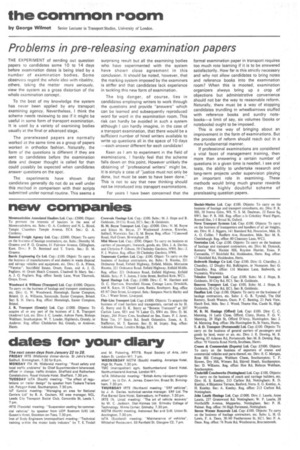Problems in pre-releasing examination papers
Page 55

If you've noticed an error in this article please click here to report it so we can fix it.
THE EXPERIMENT of sending out question papers to candidates some 10 to 14 days before examination dates is being tried by a number of examination bodies. Some observers regard the whole idea with ribaldry, others, taking the matter more seriously, view the system as a gross distortion of the whole examination concept.
To the best of my knowledge the system has never been applied by any transport examining agency. Nevertheless, I think the scheme needs reviewing to see if it might be useful in some form of transport examination. It is used by a variety of examining bodies usually at the final or advanced stage.
The prereleased papers are normally worked at the same time as a group of papers worked in orthodox fashion. Naturally, the form of the questions is different if they are sent to candidates before the examination date and deeper thought is called for than could possibly be expected when candidates answer questions on the spot.
The experiments have shown that candidates generally do not do as well under this method in comparison with their scripts submitted under normal routine. This seems a
surprising result but all the examining bodies who have experimented with the system have shown close agreement in this conclusion. It should be noted, however, that the marking system imposed by the examiners is stiffer and that candidates lack experience in tackling this new form of examination.
The big danger, of course, lies in candidates employing writers to work through the questions and provide "answers" which can be learned and subsequently reproduced word for word in the examination room. This risk can hardly be avoided in such a system although I can hardly imagine, in the case of a transport examination, that there would be a sufficient number of hired writers available to write up questions all in the space of 10 days -each answer different for each candidate!
Keen as I am to experiment in the field of examinations, I frankly feel that the scheme falls down on this point. However unlikely the obtaining of "professional writers" might be, it is simply a case of "justice must not only be done, but must be seen to have been done." This is not to say that new thinking should not be introduced into transport examinations.
For years I have been concerned that the formal examination paper in transport requires too much rote learning if it is to be answered satisfactorily. How far is this strictly necessary and why not allow candidates to bring notes and reference books into the examination room? When this is mooted, examination organizers always bring up a crop of objections but administrative convenience should not bar the way to reasonable reform. Naturally, there must be a way of stopping candidates trundling in wheelbarrows stuffed with reference books and sundry notebooks-a limit of say, six volumes (books or notebooks) ought to be imposed.
This is one way of bringing about an improvement in the form of examinations. But the process of reform should reach out in a more fundamental manner.
If professional examinations are considered a vital facet of management training, then more than answering a certain number of questions in a given time is needed. I see oral tests, the ability to undertake research and long-term projects under supervision playing an important role in examining. These methods would bring much greater rewards than the highly doubtful scheme of prereleasing question papers.




































































































